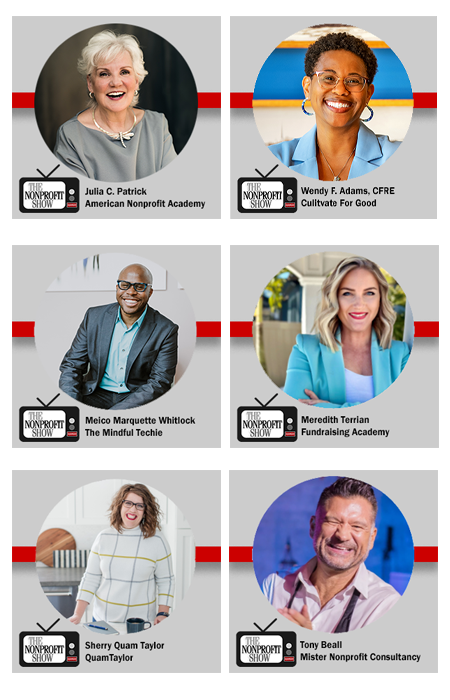
The Nonprofit Show is the daily live video broadcast where our national nonprofit community comes together for problem solving, innovation and reflection. Each day the Co-hosts and our guests cover the latest topics with fresh thinking to help you and your nonprofit amplify your social impact and achieve your mission, vision and values.
Join our Guests and Co-hosts–and Be Inspired!
Live! Monday thru Friday
Sign-up for Show Reminders!
Meet Our Co-hosts!
Made Possible By Our Generous Education Partners Who Support And Believe In The Work You Do
OUR LEARNING LIBRARY WITH MORE THAN 1,000 EPISODES!
MEET SOME OF OUR FEATURED GUESTS AND EXPERTS

In a climate charged with political unpredictability, donor hesitancy, and organizational fatigue, Peter Heller, CEO and Founder of Heller Fundraising Group, returns to offer clear-headed perspective on what nonprofits should be doing now—not later. Drawing from decades of experience in higher education and over 20 years guiding capital campaigns and feasibility studies, Peter brings both context and calm to a sector feeling increasingly unsettled.
Fundraising is never easy, Peter reminds us. But right now, it’s especially daunting. Some organizations are facing existential uncertainty, while others are tempted to pull back entirely. “Even if we stopped talking right now,” Peter says, “and people went away with this one idea: wake up in the morning and believe that you and your nonprofit deserve that money—that mindset alone can shift your entire trajectory.”
Throughout the conversation, Peter offers a compelling blend of strategic realism and aspirational leadership. His guidance is rooted in both emotional alignment and actionable frameworks: acknowledge the difficulty, reaffirm your mission, and keep going. He warns against reactive messaging rooted in fleeting political tides and instead urges organizations to craft campaigns around timeless, hopeful visions that inspire long-term support.
One of the episode’s most striking moments comes when Peter recounts the Ossining Children’s Center’s $18 million capital campaign. Despite losing their board presidents, navigating the death of a lead donor, and facing pandemic-related hurdles, they built a beautiful childcare facility now serving a vibrant, diverse community. It’s not just a story of resilience—it’s a blueprint for bold action in the face of fear.
Julia Patrick (Show host) and Peter explore why now is precisely the moment for brave leadership—especially from boards. They discuss the board dynamics that can either stall or accelerate progress, and why it’s okay if those unwilling to commit step aside. As Peter puts it, “You need a core group who believe—and aren’t just dreaming, but working toward something achievable.”
This thoughtful dialog challenges the nonprofit sector to step into its power, maintain donor relationships through both silence and conversation, and embrace mission-driven fundraising as a moral imperative rather than a burdensome chore. Whether you’re in the middle of a campaign, contemplating one, or simply trying to stay upright, this conversation offers clarity, encouragement, and a seasoned perspective on how to move forward with confidence.

The Chief Investment Officer at Christian Brothers Services, Steve Sliwinski, offers a highly approachable yet technically sound guide to nonprofit investment strategy. With decades of financial experience and dual designations as CFA and CAIA, Steve breaks down how organizations—regardless of size—can begin managing and growing their financial assets responsibly.
From policy benchmarking and committee structure to modern investment tools and trends like IP transfers and crypto, Steve’s insights will help demystify what can often be an intimidating subject. This episode is a must-watch for boards, CFOs, and executive leaders seeking clarity on how to begin—or refine—their investment approach.
The discussion begins with a history of Christian Brothers Services, which evolved from a cooperative model among Catholic schools into a nationwide provider of retirement, insurance, and investment services for thousands of institutions. This story serves as an example of scalable collaboration and strategic vision, offering NPO’s a compelling model for shared resource management.
Steve explains that waiting for a major windfall to begin investing is outdated thinking. “It’s certainly not out of reach to create a well-diversified portfolio with under $100,000,” he shares, emphasizing that even small recurring contributions—like payroll-deducted retirement savings—can grow into substantial assets over time. The message: nonprofits don’t need to be large to think long-term.
Much of the conversation centers around the role of the investment committee. Steve offers a fresh take, stating that technical expertise isn’t always necessary. What matters most is “a long-term orientation and strategic mindset.” Ideal committee size? Three to seven individuals with high-level focus, not necessarily financial professionals.
The conversation, with host Julia Patrick, continues into policy development and investment alignment with mission. Steve discusses how ESG (environmental, social, governance) or values-based screening—once costly—is now affordable and feasible even for small organizations. He encourages nonprofits to create an investment policy document in partnership with a consultant or a platform like Vanguard or Fidelity to ensure thoughtful, repeatable decision-making. He stresses the importance of sticking with the strategy through market fluctuations: “Set the policy at the beginning, know why it exists, and abide by it—especially in difficult times.”

What happens when artificial intelligence collides with nonprofit hiring? Katie Warnock, CEO and Founder of Staffing Boutique, brings over two decades of recruitment wisdom to unpack the evolving world of nonprofit staffing—where AI, automation, and applicant tracking systems are rapidly reshaping the game.
From resume reviews to video interviews scored by machines, Katie walks us through what’s real, what’s useful, and what still absolutely needs a human touch. She describes AI as a powerful tool—but not a one-size-fits-all solution.
She shares how AI can now instantly generate candidate pipelines, automate scheduling, and send emails with the ease of a few clicks. But for seasoned recruiters like Katie, there's hesitation: trust and nuance still matter. And for organizations hiring in the nonprofit space, personality and mission alignment can't be faked—no matter how good your chatbot is.
This episode also explores the do’s and don’ts of keyword optimization, especially for nonprofit resumes. Katie gets specific about how grant writers, development staff, and even tech candidates should tailor their resumes for today’s smart hiring systems. Generic titles like “fundraiser” or “event planner”? Not enough. Think: gala, silent auction, CRM platform, institutional giving.
But perhaps most eye-opening is Katie’s reflection on the new loop: AI-powered interviews are becoming so common that some candidates now use AI to answer questions during the interview—prompting some companies to head back to in-person hiring. “There has to be some sort of reversal,” Katie warns. “How do you even trust that a resume was written by the person who actually did the job?”
This is a refreshingly candid, real-world conversation about modern hiring challenges in the nonprofit sector. You’ll walk away with smarter strategies, tech tools to explore (or avoid), and a renewed appreciation for the irreplaceable value of human connection.

This fast episode plants more than a few seeds—it digs deep into the fertile soil of fundraising tech and AI, showing nonprofit leaders how to embrace new tools without fear or being overwhelmed.
Co-host Julia Patrick opens with her signature energy: “It’s always a good day when I get to work with my cohost Tony Beall,” . . .and what follows is an energizing discussion around modernizing fundraising practices. The duo tackles AI not as a villain, but as a brilliant assistant. As Tony puts it: “AI is a tool, not a takeover.”
From predictive analytics to donor segmentation, Tony outlines how AI empowers fundraisers to work smarter—not harder. He reminds us that AI “creates a tremendous opportunity for prospecting,” especially now that tools like ChatGPT are as common as Google searches.
Julia reflects on how her organization embraced AI early on. “It has revolutionized the way we do business,” she says, underscoring (not literally!) how prompts, personas, and platform features help tailor messaging to diverse donor groups.
Tony speaks to how “ChatGPT can help you refine messaging for different donor sets… it’s still your words, but it’s helping you shape the message.” He urges fundraisers to treat the tech as an editor—not a ghostwriter.
They also dig into CRM evolution, with Julia commenting, “What we get today is not what we’ll have tomorrow.” Tony shares how CRM vendors are racing to integrate AI and support their users.
The conversation rounds out with a focus on multi-generational training, acknowledging that not every team member shares the same comfort with digital tools. Tony adds that leaders must explain “why we’re doing this” so that staff can buy in, even if it feels uncomfortable at first.
This episode isn’t just about tech—it’s about change, mindset, and purpose.

Leadership meets lived experience as Eric Wilson, Director at Your Part-Time Controller (YPTC), unpacks the long-standing tension between nonprofit finance and programming. With warmth, wit, and real-world clarity, Eric takes us into the heart of the issue—how two departments with the same mission often work in silos, risking confusion, inefficiency, and financial misalignment.
From discussing budget misunderstandings to the implications of restricted funds, this episode challenges nonprofit leaders to ask themselves: “Are we communicating with intention—or just reacting when problems arise?”
Eric shares, “You don’t want people afraid to bring you a problem… I'd rather have a small problem early than a big problem later.” That mindset—proactive, people-first, and rooted in accountability—is the call to action for every executive, finance officer, and program manager tuning in.
Together with host Julia Patrick, they explore:
· Why many nonprofit staff don’t fully understand the true cost of programs
· How miscommunication around restricted funding can sabotage outcomes
· Why monthly check-ins between finance and programming are more than a best practice—they’re essential
· How fear creates silence and silence breeds mistakes
· What emotional intelligence and mutual education mean for modern nonprofit culture
This learning session is a leadership masterclass in creating cross-departmental unity through intention, clarity, and relationship-building. Whether you're a new program manager, seasoned CFO, or executive director trying to align teams—you’ll walk away with practical tools and a fresh mindset!
#NonprofitLeadership #FinanceAndProgramming #TheNonprofitShow

When a cyberattack hits your nonprofit, do you know what to do? Cybersecurity expert Michael Nouguier, Partner at Cybersecurity Services at Richey May, walks us through the essential steps every nonprofit must take—before, during, and after a cyber event. As host Julia Patrick notes, it's not a matter of if, but when, and being unprepared is no longer an option.
From clarifying what cyber insurance actually covers to practicing realistic incident response exercises, Michael offers a pragmatic and step-by-step guide tailored for nonprofit leaders. He points out, “Failure to plan is planning to fail,” and urges organizations to move beyond hope and into action.
The conversation dissects misconceptions, such as thinking IT alone can handle a breach or believing cyber insurance is a comprehensive solution. Instead, Michael recommends building internal resilience with tabletop exercises that include the board, C-suite, legal, and communications staff. These scenario-based run-throughs help teams build muscle memory and prevent panic when disaster strikes.
Third-party vendors—often a hidden weak spot—are addressed in detail. Michael reminds us, “You are the trusted data collector,” meaning nonprofits must ensure their vendors share the same security culture, including notification clauses and accountability.
What if the worst happens? Michael stresses calm, communication, and preservation of evidence. “Don’t delete anything,” he cautions, as doing so can sabotage forensic investigations and potential fund recovery. He also reminds leaders to report incidents to local authorities and the FBI’s IC3.gov, reinforcing the legal and ethical responsibility to act swiftly and transparently.
Perhaps one of the most human insights is around fostering a blame-free culture. Employees fearing punishment won’t report mistakes, making things worse. “Everyone—even me—has clicked a phishing link,” Michael admits, highlighting the importance of openness and psychological safety within teams.
Ultimately, this is a call to action for nonprofit leaders to shift from avoidance to preparedness. Cyberattacks are not just technical disruptions—they can financially and operationally dismantle an organization. With the right mindset, strategy, and communication plan, your nonprofit can weather the storm and keep its mission alive!

A clear message: “Generosity is not dead—it’s transforming”, says Ann Fellman, Chief Marketing Officer at Bloomerang. As headlines churn out fatigue-inducing stories of donor decline and uncertainty, Ann injects much-needed optimism rooted in data and strategy.
“We are in it now,” Ann declares about the $70 trillion wealth transfer, urging nonprofits to act instead of waiting for the perfect moment. Drawing from the latest Giving USA 2024 findings, she reminds us that individual giving reached a staggering $592.5 billion, with 66% of that coming directly from individuals. “Individual Americans are ready and willing to support,” she tells us.
This recent conversation navigates beyond donor behavior into practical strategy. Ann challenges fundraisers to rethink short-term vs. long-term planning and ‘get real about programming priorities: What must be done, what should be done, and what would be nice to do?’ She lays out a compelling scenario-based approach to planning for revenue shifts, especially in a landscape threatened by grant losses and funding uncertainty.
She also makes a strong case for recurring giving. “Would you rather have a one-time $100 gift or $10 a month for years?” she asks. Despite the low adoption rate, recurring programs offer sustainable, predictable revenue and are easy to implement with today’s tech. She even floats the bold concept of creating a “monthly giving officer”—a role few, if any, nonprofits have embraced but one that could radically improve outcomes.
Transparency, too, is no longer optional. Citing data from Bloomerang’s Mission: Retainable report, Ann points out that while 65% of donors crave regular impact updates, only 36% of nonprofits actually deliver them. In an era when trust is easily eroded, communicating funding gaps and showing how you're responding builds confidence and inspires donors to act.
As Ann beautifully puts it: “There is generosity. It’s alive and well.”
00:00:00 Welcome & Introduction to Ann Fellman
00:02:30 What Bloomerang Actually Does for Nonprofits
00:04:15 How Tech + People = Better Fundraising
00:06:15 The Truth About American Generosity
00:08:30 Giving USA 2024 Highlights: $592B Raised!
00:10:00 Generational Wealth Transfer: $70 Trillion Opportunity
00:13:00 Donor Communication Gaps and Impact Reports
00:15:00 Monthly Giving—The Most Underrated Strategy
00:20:00 Scenario Planning: Must Do, Should Do, Nice to Do
00:24:00 How Transparency Builds Donor Trust
00:27:00 Highlighting Funding Gaps Without Fear
00:30:00 Final Thoughts: Don’t Be Discouraged, Generosity Is Alive

Jeffrey Wilcox (President) and Joan Brown (COO) of the Interim Executives Academy unpack the harsh realities of nonprofit leadership turnover—and the game-changing role of interim executives.
Jeffrey starts this lively session with. . . “Interim leaders aren’t temps—they’re bees, cross-pollinating wisdom to prepare organizations for their next leader.” Joan Brown backs it up, revealing why first-time nonprofit CEOs crash and burn—often due to unclear job expectations, chaotic HR structures, and boards that operate like secret societies instead of partners.
This bouyant conversation with host Julia Patrick, gets real fast:
HR disasters are the #1 reason leaders get fired—think vague job roles, favoritism, and financial denial.
Boards scare new execs by locking them out of meetings instead of mentoring them.
Interims aren’t just placeholders—they’re strategic fixers who spend 9–12 months prepping orgs for long-term success.
Looking ahead, Jeffrey and Joan warn nonprofits: “If you’re only relevant to yourself, you’re already dying.” The future demands sustainable leadership, emotional intelligence, and ditching outdated board models that hold orgs back.

How do you win the hearts—and hands—of Gen Z donors? According to Emily Tisdale, West Coast Manager for Team for Cures at the Multiple Myeloma Research Foundation (TheMMRF.org), you stop seeing them as “the future” and start engaging them right now.
In this lively session, Julia C. Patrick explores Gen Z’s philanthropic behavior with Emily, who’s on the frontlines of volunteer and donor engagement across three major markets. Emily doesn’t mince words: “This generation is not transactional. They want to be part of the change.” That means showing up, speaking out, and yes—expecting organizations to be transparent and impact-driven.
Emily explains how COVID-era isolation shaped Gen Z’s digital-first instincts, but also fueled a hunger for purpose. Whether it’s advocacy via Instagram, fundraising through peer networks, or attending real-life charity walks, Gen Zers are ready to get involved—when the mission speaks to them. “They don’t want to just cut a check and sit back,” she adds. “They want action.”
Julia challenges common assumptions about younger donors being flaky or too young to matter. Emily pushes back with stories of college students becoming long-term supporters, and volunteers maturing into major funders. “We need to meet them where they are today,” she says. “Because where they’re going is powerful.”
The conversation covers everything from social media strategies to cross-generational mentorship. One standout idea? Pair Gen Z volunteers with seasoned ones to create a mutual growth loop. “Our high-impact volunteers can become our highest-impact donors,” Emily points out.
Whether you’re building out a peer-to-peer campaign or rethinking how you cultivate loyalty, this episode offers a smart, real-world roadmap for tapping into Gen Z’s energy and values.

In a whirlwind of nonprofit questions from viewers, Julia C. Patrick and Tony Beall splash into the world of fundraising mysteries. "We need to diversify our funding streams," Tony begins, setting the tone for a conversation that's part strategy session, part confessional. From the complex dance of fundraising committees to the cutting-edge world of cryptocurrency donations, these nonprofit mavens dissect the industry's most pressing questions with surgical precision and infectious enthusiasm.
How do fundraising committees work with board members? Committees can serve as talent pipelines and engagement platforms, with board members actively recruiting committee members.
Should nonprofits accept cryptocurrency donations? Yes, but carefully uate organizational readiness, donor demographics, and infrastructure.
What's the typical fundraising performance ratio? Generally 1:5 to 1:10 for development officers, varying by specific role and organization.
Are printed annual reports still relevant? Offer both print and digital versions, tailoring to donor preferences and organizational resources.
How should fundraisers demonstrate their value? Beyond monetary metrics, highlight pipeline development, donor retention, and mission impact.
00:00:00 Show Introduction and Sponsors
00:02:08 Fundraising Committees Deep Dive
00:07:51 Cryptocurrency and Donor Advised Funds
00:14:29 Annual Report Strategies
00:19:07 Fundraiser Performance Metrics
00:28:25 Closing Remarks and Gratitude
#TheNonprofitShow #FundraisingInnovation #NonprofitStrategy

Thinking of opening a nonprofit thrift store? Before you dust off those donation bins, take a lesson from Kate Thoene, CEO of New Life Center., as she gives us a masterclass in turning a pile of secondhand shoes into sustainable impact. Spoiler: It’s not as easy as slapping a price tag on old lamps and hoping for the best.
At Hope’s Closet, the social enterprise Kate oversees, “we don’t take anything that makes you ask, ‘Should I donate this or toss it?’” That tough-love clarity is part of what keeps their thrift shop not just afloat—but thriving. From curated donation bins and strategic store layouts to voucher programs for survivors of domestic violence, Kate walks us through how her organization uses retail to empower recovery, generate unrestricted revenue, and build community loyalty.
She breaks down staff structure (a mix of full-time employees and 1,000+ volunteers), donation flow (“you need new items hitting the floor daily”), and even how color-coded tags help them cycle out stale inventory. Plus, we learn about their fruitful partnership with Big Brothers Big Sisters—where unsellable items are bought by the pound, keeping the store clutter-free and the landfill grateful.
Don’t miss how this 5,000-square-foot shop became a community engine, churning out real, trackable impact. Kate shares insights on metrics, bonus incentives, messaging at point-of-sale, and even the exciting possibility of store #2. And yes, there's a half-off sale where even the “rules” go on discount.
If you’ve ever wondered whether charity shops are worth the effort, Kate answers that with a resounding yes—as long as you’re ready to think like a retailer, hustle like a startup, and lead with mission.
"The more we sell, the more we help survivors of domestic violence." — Kate Thoene
#ThriftWithPurpose #thriftstores #TheNonprofitShow

Stephen Minix—VP of Community at UpMetrics—lays bare the myth that collaboration simply “happens” in the nonprofit sector. His assertion is sharp: “If I can cut the check, I can set the terms.” This statement cuts to the core of a sector that talks community but often operates in silos defined by funding power dynamics and compliance culture.
What emerges in this conversation is a compelling argument for a wholesale reframe of how nonprofits and funders work together. Collaboration, Stephen insists, isn't a mood or a moment—it’s a skill set that demands communication, clarity, and most of all, pre-work. Too often, organizations show up to collaborate without knowing what they’re actually prepared to give up, or what success even looks like in shared terms. “You can't play social impact ping-pong by yourself,” he notes. “You need a partner to hit it back.”
But this episode goes even deeper. Stephen challenges the performative elements of both philanthropy and nonprofit operations—conferences, reports, retreats—suggesting they often mask the hard reality: without time, trust, and aligned incentives, collaboration is nothing more than theater.
He offers practical alternatives. Funders should meet nonprofits in their spaces. Trust-based philanthropy, he says, doesn’t mean abandoning data—it means letting the nonprofit define what success looks like and equipping them with the tools to track and tell their story. It’s not about validation. It’s about learning.
Perhaps most powerfully, Stephen reframes trust as a proxy for risk tolerance. Real trust means relinquishing control—something many funders still find difficult. “We don’t wait till the end of the year to decide if our kids can read,” he says. “So why do we wait to uate nonprofit impact in annual reports?”
This episode doesn’t offer easy answers—but it does offer a framework for harder, more authentic conversations. It’s a must-watch for anyone tired of sugarcoated collaboration and ready to commit to real change.

If you've ever wondered whether your nonprofit fundraising data is a treasure chest or a digital junk drawer, Greg Warner is here with a flashlight, a map, and a pickaxe. In this entertaining conversation, Greg—CEO of MarketSmart and creator of the Fundraising Report Card—joins host Julia Patrick to dissect the murky waters of metrics and help nonprofits move from guesswork to grounded strategy.
Greg kicks off with the backstory: MarketSmart’s 17-year evolution into a marketing automation firm helping nonprofits identify, qualify, and steward major and legacy donors. ‘The Fundraising Report Card’, born from this journey, now offers nonprofits a simplified yet powerful lens into donor behavior—showing not just what happened, but what it means.
Here’s the twist: until now, this tool has been free. But with over 27,000 users and a mountain of benchmark data, Greg’s team is rolling out a more robust version—with peer comparisons so relevant, they make national averages look like vague horoscopes.
And it’s about time. “Relevance creates resonance,” Greg shares, “But irrelevant data creates dissonance.” Nonprofits have long been running on emotional narratives and gut instincts. Greg invites you to reframe the conversation using donor lifetime value, retention data, and institutional memory—all quantified, all visual.
Julia comments how too many development pros spend two days prepping board reports for seven minutes of attention. Greg’s fix? Collaborative tools baked into the new version of the app, enabling real-time, cross-functional dialogue. Because why silo data when you can democratize it?
Want to stop flying blind and start mining gold? This episode is your blueprint.
#FundraisingData #DonorAnalytics #TheNonprofitShow

What happens when a PTA president-turned-techie disrupts the nonprofit auction world? You get Roger Devine, co-founder of SchoolAuction.net, a man on a mission to make fundraising events both profitable and meaningful. In this fast-moving conversation with host Julia Patrick, Roger doesn’t just talk events—he redefines them.
From live auctions and paddle raises to the fine art of keeping silent auctions out of the ballroom, Roger offers a field-tested guide to modern event strategy. “I want to treat a fundraiser as if it is a fundraiser—I expect to make money,” Roger declares. And he means it.
But this isn’t just about money—it’s about momentum. Events aren’t just financial tools; they’re culture-building machines. Roger explains how strategic gatherings can cultivate younger donors, lift staff morale, recognize unsung heroes (like teachers and mission staff), and pull entire communities back into connection after years of distraction.
He makes a compelling case for fixed-price purchases (think raffles, gift cards, and sign-up parties), lowering barriers to entry, and offering dignity and opportunity to every guest—whether they’re dropping $25 or $25,000.
Oh, and about those paddle raises? Roger’s advice is clear: don’t wing it with your local news anchor. A trained benefit auctioneer is essential—not just for showmanship, but because they can drive up to 50% of your total event revenue. Skip this at your peril.
Watch and you'll also learn:
· How hybrid and virtual fundraising have evolved (spoiler: most aren't fun anymore)
· How to smartly integrate consignment travel packages (hint: only if Bob Bigshot’s coming)
· Why accessibility matters—and how a volunteer ticket swap can make all the difference
Whether you're planning your first gala or overhauling your tenth, this episode will shake up your thinking. Because fundraising events shouldn't be a chaotic night of stress—they should be joyful, purposeful, and yes, wildly effective!
Join the ongoing conversation at #TheNonprofitShow
#EventFundraising #FundraisingAuctions

Are you still chasing a “low overhead” badge of honor? Gregg Indictor, Director at Your Part-Time Controller, confronts one of the nonprofit sector’s most persistent misinterpretations: the overhead myth. With cohosts Julia Patrick and Meico Marquette Whitlock, the conversation unpacks what "overhead" actually represents, why it’s often misunderstood, and how nonprofits can more accurately reflect their financial stewardship.
Gregg begins by demystifying overhead as merely the administrative costs necessary to support any organization’s operations—nonprofit or for-profit, saying, “There is no correct overhead ratio for any organization,” noting that effectiveness should be measured by mission impact, not accounting percentages.
This fast episode fully explores cost allocation, the process of categorizing and reporting expenses across functions—such as program services, management, and fundraising. Gregg walks through the Schedule of Functional Expenses found in audits and IRS Form 990, and explains how misallocating indirect costs can produce distorted financial portraits. His emphasis on methodology—such as time and effort tracking for personnel, or square footage for facility expenses—underscores the importance of reasonable and consistent cost assignment.
Gregg highlights a powerful metric: for most nonprofits, 80–85% of expenses stem from personnel and facilities. Yet not all of those costs are necessarily “overhead”—they could very well contribute directly to mission delivery, depending on how they are allocated.
One of the key moments involves Gregg’s perspective on restricted vs. unrestricted funds. He cautions against well-meaning development practices that inadvertently solicit restricted gifts, reducing an organization’s flexibility to cover essential functions. A simple shift in donor language—from “choose your program” to “support our mission”—can dramatically improve financial resilience.
As the trio discuss transparency and internal communication, Gregg advocates for cross-departmental access to financial information, encouraging organizations to present timely reports not just to leadership, but also to program and fundraising teams. This transparency supports better decision-making and breaks down operational silos.
In a moment of clarity, Gregg quotes Dan Pallotta’s Uncharitable: “We don’t want our generation’s epitaph to read: ‘We kept charities’ overhead low.’ What we want it to read is: ‘We changed the world.’” This reframing of the narrative away from efficiency metrics toward effectiveness and impact becomes the episode’s rallying point. You’ll learn a lot watching this!
00:00:00 Welcome and guest introduction
00:03:08 What is nonprofit overhead and why it matters
00:05:29 The problem with restricted funding
00:07:36 Understanding cost allocation
00:11:02 How overhead ratios are calculated
00:13:44 80–85% of expenses: what that really means
00:16:21 Allocating costs accurately and fairly
00:18:38 Why everyone in a nonprofit should understand finance
00:20:17 Internal transparency and financial reporting
00:22:06 Overhead myths vs. operational reality
00:24:20 Contributed vs. earned revenue
00:27:02 Changing the donor messaging to support sustainability
Follow the ongoing conversation at #TheNonprofitShow




















